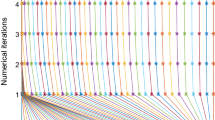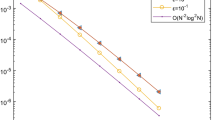Abstract
A singularly perturbed Volterra integro-differential equation with an integrable singularity in the integral term is considered. The upwind difference method is used to discretize the singularly perturbed Volterra integro-differential equation. The stability properties and a posteriori error analysis for the discrete scheme are given. Since a priori information of the exact solution may be difficult to obtain, a posteriori adaptive algorithm based on a posteriori error analysis is established by equidistributing arc-length monitor function which attempts to automatically detect the singular behavior of the solution. Numerical experiments support this theoretical result.
Similar content being viewed by others
References
Angell, J.S., Olmstead, W.E.: Singularly perturbed Volterra integral equations II. SIAM J. Appl. Math. 47, 1–14 (1987)
Chen, Y.: Uniform convergence analysis of finite difference approximations for singular perturbation problems on an adapted grid. Adv. Comput. Math. 24, 197–212 (2006)
Das, P.: Comparison of a priori and a posteriori meshes for singularly perturbed nonlinear parameterized problems. J. Comput. Appl. Math. 290, 16–25 (2015)
Diethlm, K.: The Analysis of Fractional Differential Equations. Springer, Berlin (2010)
Farrell, P.A., Hegarty, A.F., Miller, J.J.H., O’Riordan, E., Shishkin, G.I.: Robust Computational Techniques for Boundary Layers. Chapman & Hall Press, London (2000)
Hoppensteadt, F.C.: An algorithm for approximate solutions to weakly filtered synchronous control systems and nonlinear renewal processes. SIAM J. Appl. Math. 43, 834–843 (1983)
Horvat, V., Rogina, M.: Tension spline collocation methods for singularly perturbed Volterra integro-differential and Volterra integral equations. J. Comput. Appl. Math. 140, 381–402 (2002)
Jordan, G.S.: A nonlinear singularly perturbed Volterra integrodifferential equation of nonconvolution type. Proc. R. Soc. Edinb. 80(3–4), 235–247 (1978)
Kauthen, J.P.: Implicit Runge-Kutta methods for some integrodifferential-algebraic equations. Appl. Numer. Math. 13, 125–134 (1993)
Kauthen, J.P.: Implicit Runge-Kutta methods for singularly perturbed integro-differential systems. Appl. Numer. Math. 18, 201–210 (1995)
Kopteva, N.: Maximum norm a posteriori error estimates for a one-dimensional convection-diffusion problem. SIAM J. Numer. Anal. 39, 423–441 (2001)
Kopteva, N.: Maximum norm a posteriori error estimates for a 1D singularly perturbed semilinear reaction-diffusion problem. IMA J. Numer. Anal. 27, 576–592 (2007)
Kopteva, N.: Maximum norm a posteriori error estimate for a 2D singularly perturbed semilinear reaction-diffusion problem. SIAM J. Numer. Anal. 46, 1602–1618 (2008)
Kumar, M., Singh, P., Mishra, H.K.: A recent survey on computational techniques for solving singularly perturbed boundary value problems. Int. J. Computer Math. 84, 1439–1463 (2007)
Linss, T.: Analysis of a system of singularly perturbed convection-diffusion equations with strong coupling. SIAM J. Numer. Anal. 47, 1847–1862 (2009)
Linss, T.: A posteriori error estimation for a singularly perturbed problem with two small parameters. Int. J. Numer. Anal. Model. 7, 491–506 (2010)
Liu, L.-B., Chen, Y.: A robust adaptive grid method for a system of two singularly perturbed convection-diffusion equations with weak coupling. J. Sci. Comput. 61, 1–16 (2014)
Liu, L.-B., Chen, Y.: Maximum norm a posteriori error estimates for a singularly perturbed differential difference equation with small delay. Appl. Math. Comput. 227, 801–810 (2014)
Liu, L.-B., Chen, Y.: An adaptive moving grid method for a system of singularly perturbed initial value problems. J. Comput. Appl. Math. 274, 11–22 (2015)
Liu, L.-B., Chen, Y.: A-posteriori error estimation in maximum norm for a strongly coupled system of two singularly perturbed convection-diffusion problems. J. Comput. Appl. Math. 313, 152–167 (2017)
Lodge, A.S., McLeod, J.B., Nohel, J.A.: A nonlinear singularly perturbed Volterra integrodifferential equation occurring in polymer rheology. Proc. R. Soc. Edinb. 80(1–2), 99–137 (1978)
Roos, H.-G., Stynes, M., Tobiska, L.: Robust Numerical Methods for Singularly Perturbed Differential Equations: Convection-Diffusion-Reaction and Flow Problems, 2nd edn., vol. 24. Springer, Berlin (2008)
Salama, A.A., Bakr, S.A.: Difference schemes of exponential type for singularly perturbed Volterra integro-differential problems. Appl. Math. Model. 31, 866–879 (2007)
Sevgin, S.: Numerical solution of a singularly perturbed Volterra integro-differential equation. Adv. Differ. Equ. 2014, 171 (2014)
Willett, D., Wong, J.S.W.: On the discrete analogues of some generalizations of Gronwall’s inequality. Monatshefte Math. 69(4), 362–367 (1965)
Xu, J., Zhong, S.: A generalized Gronwall inequality and its application in a fractional differential equation. J. **hua Univ. (Nat. Sci.) 31(5), 62–64 (2012)
Acknowledgements
We would like to thank the anonymous reviewers for some suggestions for the improvement of this paper.
Funding
The work was supported by the Project of Philosophy and Social Science Research in Zhejiang Province (Grant No. 19NDJC039Z), Humanities and Social Sciences Planning Fund of Ministry of Education of China (Grant No. 18YJAZH002), Zhejiang Provincial Public Welfare Project of China (Grant No. LGF19A010001), Major Humanities and Social Sciences Projects in Colleges and Universities of Zhejiang Province (Grant No. 2018GH020), Ningbo Municipal Soft Science Foundation (Grant No. 2018A10041), Zhejiang Provincial Natural Science Foundation of China (Grant No. LY18A010001), National Natural Science Foundation of China (Grant No. 11761015), and Natural Science Foundation of Guangxi (Grant No. 2017GXNSFBA198183).
Author information
Authors and Affiliations
Corresponding author
Additional information
Publisher’s note
Springer Nature remains neutral with regard to jurisdictional claims in published maps and institutional affiliations.
Rights and permissions
About this article
Cite this article
Huang, J., Cen, Z., Xu, A. et al. A posteriori error estimation for a singularly perturbed Volterra integro-differential equation. Numer Algor 83, 549–563 (2020). https://doi.org/10.1007/s11075-019-00693-y
Received:
Accepted:
Published:
Issue Date:
DOI: https://doi.org/10.1007/s11075-019-00693-y




